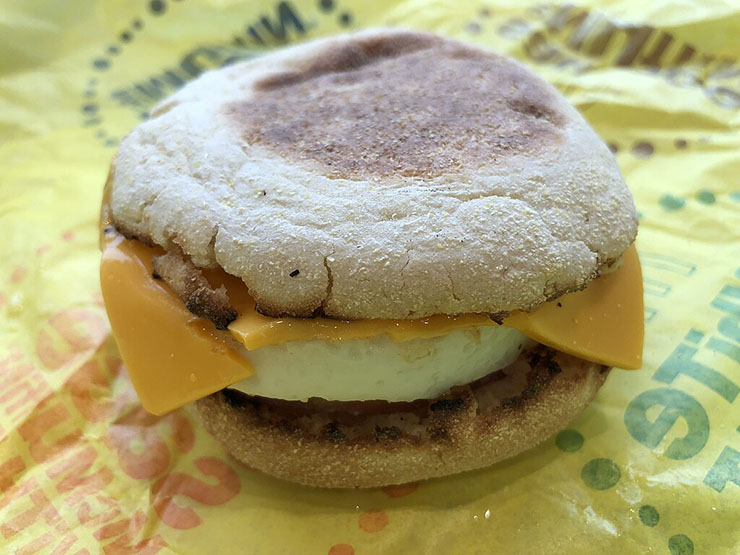When it comes to insulting the intelligence of television viewers, the award for most insulting could go to any number of commercial products and companies over the years. But few advertisements give more cause for consternation than the current offering from McDonald’s aimed at selling its famous breakfast sandwich, the Egg McMuffin.
“You have all the ingredients for this in your fridge” the voice of British character actor Brian Cox smugly intones, as we watch an egg cracked over a black disk of futuristic-looking alloy resting on a hot grill and hear the strains of an angelic choir in the background. “But ask yourself this: Of all the times you’ve made it at home, has it ever tasted like our McMuffin? Badda bum bum buh …”
The answer, of course, is a resounding no. It’s tasted far better.
The rise of McDonald’s to the status of fast-food colossus without peer is no mystery, and was illustrated well in the ironically titled 2016 film The Founder, in which Michael Keaton as Ray Kroc shrewdly supersizes the restaurant concept of the two McDonald brothers—the true founders of the chain—and in so doing made their family name a byword for American corporate and cultural dominance in the world. A socialist Finnish artist some years ago even fashioned a sculpture of the chain’s clown mascot Ronald McDonald hanging from a cross, dead.
Speedy service, a menu of familiar 1950s carhop foods and drinks, consistency wherever the location, an understanding that owning the real estate was key, and perhaps most important, a pied piper appeal to children, crowned McDonald’s as the country’s, and ultimately the planet’s, burger king.
In the interest of full disclosure, the night manager of the famous East Fordham Road McDonald’s in the Bronx, Curtis “The Rock” Sliwa, hired me at age 16 and signed me up for the garbage clean-up “Rock Brigade.” Within months the brigade turned into the “Magnificent 13,” and then became the now-international, red beret-donning Guardian Angels safety patrol, a citizens’ watch group. My mother had been one of the original employees who opened that same McDonald’s in 1974. Later, while attending university, I would work in the McDonald’s on Dublin’s Grafton Street.
It was the perfect job for many teens, not to mention middle-aged mothers with minimal previous employment whose children were beginning to be able to take care of themselves. Like so many, I had come under the chain’s spell early. Having seen the “McDonald’s is your kind of place” commercials, as a spoiled eight-year-old I got my father on more than one occasion to take me to the very first McDonald’s that opened in the Bronx. This entailed a labyrinthine subway journey downtown into Manhattan, changing trains, and riding back up and out to the east Bronx, followed by an absurd 11-block walk to Boston Post Road, then returning home the same way … on the man’s one day off during the week.
Despite all that, for many years McDonald’s has held a spot securely at the bottom of the list of fast-food restaurants worthy of patronizing. Beyond its longtime wokeness, prefigured by an infamous, record-breaking million-dollar contribution to the Democratic National Committee from Kroc’s widow during the Reagan era, the chain’s famed dependability for quality and customer experience has plummeted. You’re often lucky if the employee taking your order speaks English fluently, and the tastes I once considered worth walking 11 blocks for are simply not there.
The “spread” on a “Double-Double” at In-N-Out Burger is practically identical to the special sauce on a Big Mac. Except it’s fresher and the two all-beef patties are bigger, more carefully prepared, and handed to you with a smile by a worker who has been vetted and drilled on unfailing quality control. The poultry at quality-reigns-supreme Chick-fil-A has none of the mystery attached to Chicken McNuggets. Thus, local openings of either of these challengers to McDonald’s supremacy are PR bonanzas akin to what McDonald’s openings were half a century ago.
And yet McDonald’s just enjoyed a 14 percent surge in revenue for the latest quarter, some $6.69 billion for July, August and September, beating analysts’ expectations of $6.58 billion, according to Refinitiv, and driven by “strategic menu price increases” that will relieve your wallet of no less than $18 for a Big Mac with small fries and a soda at some locations. I can remember Big Macs costing 65 cents. If you bought McDonald’s stock five years ago you can sell it today for 47 percent more than what you paid. In high population regions you will seldom see a McDonald’s deserted, and the company’s confidence is such that in September it increased the royalty fee it requires of franchisees for the first time in nearly three decades. Next year it will even be testing a science-fictiony spinoff of smaller restaurants to be called CosMc.
The fast-food chain choices available to consumers today are leaps and bounds greater and more diverse than they were when McDonald’s grew to cultural prominence in the early 1970s. Today’s options range from Subway’s array of made-in-front-of-you foot-long subs to Wendy’s never-frozen burgers and original fast food chain White Castle’s delectable grease, to Chipotle Mexican Grill’s minimalist, ultra-fresh, transparency-in-preparation model (a chain whose early growth for nearly a decade was backed by heavy investment from McDonald’s Corporation). And yet consumers consistently pay through the nose for McMediocrity despite all the ingredients being in their fridge. Is this brand’s legacy everlasting, like that of the Beatles, who somehow just released a single nearly 43 years after John Lennon’s death? Or do fast-food consumers finally deserve a break today from being taken for granted?



Leave a Reply